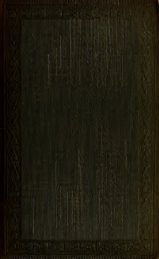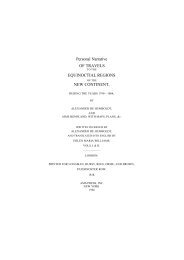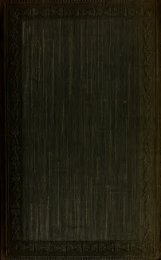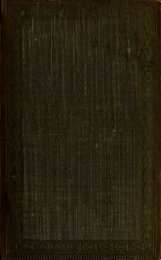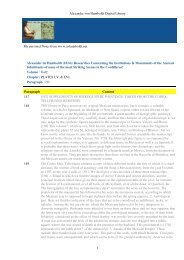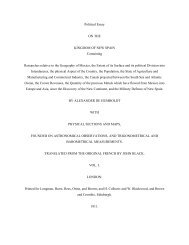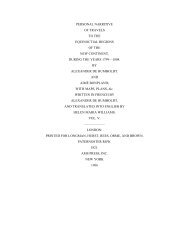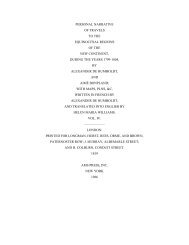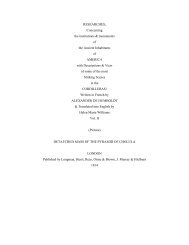See the complete document here
See the complete document here
See the complete document here
Create successful ePaper yourself
Turn your PDF publications into a flip-book with our unique Google optimized e-Paper software.
SOO<br />
COSMOS.<br />
py <strong>the</strong> easteia shores of <strong>the</strong> Atlantic, <strong>the</strong> boun laries of which<br />
appear to he constantly brought nearer and nearer to one an*<br />
blame are strangely mingled in it. We see that dislike and suspicion of<br />
fraud augmented in proportion as <strong>the</strong> fame of <strong>the</strong> Florentine navigatoi<br />
spread. In <strong>the</strong> preface (Prolongo) which was written first, Las l^asas<br />
says, '•<br />
Amerigo relates what he did in two voyages to our Indies, but<br />
he appears to have passed over many circumstances, whe<strong>the</strong>r design-<br />
edly (« saviendas), or because he did not attend to <strong>the</strong>m. This circumstance<br />
has led some to attribute to him that which is due to o<strong>the</strong>rs, and<br />
which ought not to be taken from <strong>the</strong>m." The judgment pi'onounced<br />
in <strong>the</strong> 1st book (chap. 140) is equally moderate :<br />
" Here I must speak<br />
of <strong>the</strong> injustice which Amerigo, or perhaps those who printed (d los<br />
que imprimiiroji) <strong>the</strong> Quatuor Navigatio7ies, appear to have committed<br />
toward <strong>the</strong> admiral. To Amerigo alone, without naming any o<strong>the</strong>r, <strong>the</strong><br />
discovery of <strong>the</strong> continent is ascribed. He is also said to have placed<br />
<strong>the</strong> name of America in maps, thus sinfully failing toward <strong>the</strong> admiral<br />
As Amerigo was learned, and had <strong>the</strong> power of writing eloquently {era<br />
latino y eloquente), he represented himself in <strong>the</strong> letter to King Rene<br />
as <strong>the</strong> leader of Hojeda's expedition ; yet he was only one of <strong>the</strong> seamen,<br />
although experienced in seamanship and learned in cosmography<br />
{liombre entendldo en las cosas de la mar y docto en . . .<br />
Cosmographia).<br />
In <strong>the</strong> w^orld <strong>the</strong> belief prevails that he was <strong>the</strong> first to set foot on <strong>the</strong><br />
main laud. If he purposely gave currency to this belief, it was great<br />
wickedness; and if it was not done it intentionally, looks like it (clara<br />
pareze la falsedad : y si fue de industria kecha maldad grande fui. ; y<br />
ya que no lo fuese, al menos parezelo'). . . . Amerigo is represented as<br />
having sailed in <strong>the</strong> year 7 (1497): a statement that seems, indeed, to<br />
have been only an oversight in writing, and not an intentional false<br />
statement (pareze aver avido yerro de pendola y no malicia), because he<br />
is stated to have returned at <strong>the</strong> end of eighteen months. The foreign<br />
writers call <strong>the</strong> country America; it ought to be called Columba."<br />
This passage shows clearly that up to that time Las Casas had not ac<br />
cused Amerigo of having himself brought <strong>the</strong> name America into usage.<br />
He says, an tornado los escriptores estrangeros de nomhrar la nuestra<br />
Tierra Jirme America, como si Americo solo y no otro con it y antes que<br />
todos la oviera descuhierto. In lib. i., cap. 164-169, and in lib. ii., cap.<br />
2, of <strong>the</strong> work, his hatred is fully expressed ; nothing is now attributed<br />
to erroneous dates, or to <strong>the</strong> partiality of foreigners for Amerigo all ia<br />
;<br />
intentional deceit, of which Amerigo himself is guilty (de industria lo<br />
hizo . . .<br />
persisilo en el engano .... de falsedad esta claramentc convencido).<br />
Bartholome de las Casas takes pains, moreover, in two passages,<br />
to show especially that Amerigo, in his accounts, falsified <strong>the</strong><br />
succession of <strong>the</strong> occurrences of his first two voyages, placing many<br />
things which belonged to <strong>the</strong> second voyage in <strong>the</strong> first, and vice versa.<br />
It seems very strange to me that <strong>the</strong> accuser does not appear to have<br />
felt liow much <strong>the</strong> weight of his accusations is diminished by <strong>the</strong> circumstance<br />
that he himself speaks of <strong>the</strong> opposite opinion, and of <strong>the</strong><br />
indifference of <strong>the</strong> person who would have been most interested in at-<br />
tacking Vespucci, if he had believed him guilty and ho?tilely disposed<br />
agaiust his fa<strong>the</strong>r and himself. " I can not but wonder," says Las Casaa<br />
(cap. 164), "that Hernando Colon, a clear-sighted man, who, as I certainly<br />
know, had in his hands Amerigo's accounts of his travels, should<br />
not have remarked in <strong>the</strong>m any deceit or<br />
injustice toward <strong>the</strong> admi-<br />
ral." As I had LI fie-h o[»port!ii ity, a few months ago, of examining i}ie



